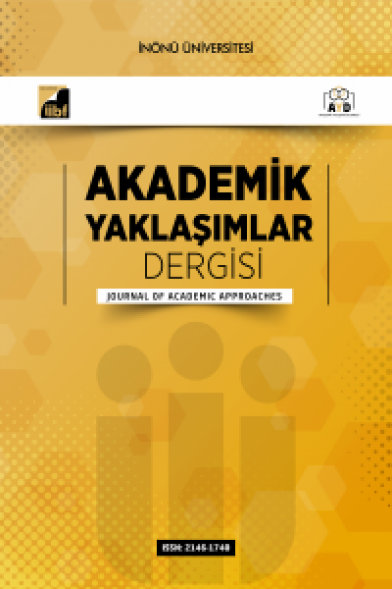The Importance of Policy Coherence for Turkey’s Sustainable Food Security Policy
Policy Coherence, Food Security, Environmental Security, Sustainable Development.
THE IMPORTANCE OF POLICY COHERENCE FOR TURKEY’S SUSTAINABLE FOOD SECURITY POLICY
___
- Ali, A. & Erenstein, O. (2017). Assessing farmer use of climate change adaptation practices and impacts on food security and poverty in Pakistan. Climate Risk Management, 16, 183-194.
- Anonymous (2019). Turkey’s 2nd VNR 2019 sustainable development goals: Strong ground towards common goals. 9 January 2022, https://sustainabledevelopment.un.org/content/documents/23862Turkey_VNR_.
- Barnett, J. (2001). The meaning of environmental security: Ecological politics and policy in the new security era. Zed Books.
- Barrett, C. B. (2010). Measuring food insecurity. Science, 327 (5967), 825-828.
- Campbell, B. M., Vermeulen, S. J., Aggarwal, P. K., Corner-Dolloff, C., Girvetz, E., Loboguerrero, A. M., ... & Wollenberg, E. (2016). Reducing risks to food security from climate change. Global Food Security, 11, 34-43.
- Carbone, M. (2008). Mission impossible: The european union and policy coherence for development. Journal of European Integration, 30 (3), 323-342.
- Chernova, I. I., Balashova, E. A., Dolotin, A. I., Senatorov, D. V. & Kolina, A. M. (2021). Specifics of application of economic mechanisms to ensure environmental safety in the oil and gas industry. IOP Conference Series: Earth and Environmental Science. (pp.1-4). 808 012059.
- Coates, J. (2013). Build it back better: Deconstructing food security for improved measurement and action. Global Food Security, 2 (3), 188-194.
- Dinar, S. (2011). Beyond resource wars: Scarcity, environmental degradation, and international cooperation. The MIT Press.
- Ericksen, P. J., Ingram, J. S. & Liverman, D. M. (2009). Food security and global environmental change: Emerging challenges. Environmental Science & Policy, 12 (4), 373-377.
- FAO (1996). Rome declaration on world food security and world food summit plan of action. Report of the World Food Summit.
- Floyd, R. (2008). The environmental security debate and its significance for climate change. The International Spectator, 43 (3), 51-65.
- Gleditsch, N. P. & Diehl, P. F. (2000). Environmental conflict: An anthology. Westview Press.
- Homer-Dixon, T. F. (1994). Environmental scarcities and violent conflict: Evidence from cases. International Security, 19 (1), 5-40.
- Nilsson, M., Zamparutti, T., Petersen, J. E., Nykvist, B., Rudberg, P. M. & McGuinn, J. (2012). Understanding policy coherence: Analytical framework and examples of sector-environment policy interactions in the EU. Environmental Policy and Governance, 22 (6), 395-423.
- Peng, W. & Berry, E. M. (2019). The concept of food security. Encyclopedia of food security and sustainability, 2 (1), 1-7.
- Pinstrup-Andersen, P. (2009). Food security: Definition and measurement. Food Security, 1 (1), 5-7.
- Price-Smith, A. T. (2001). The health of nations: Infectious disease, environmental change, and their effects on national security and development. The MIT Press.
- Presidency of Turkey (2020). 2020 UN high-level political forum sustainable development goals 2018-2020 developments in Turkey. 9 January 2022, https://hlpf.un.org/.
- Republic of Turkey Ministry of Development (2001). The eight five-year development plan 2001-2005.
- Republic of Turkey Ministry of Development (2006). The ninth development plan 2007-2013.
- Republic of Turkey Ministry of Development (2012). Turkey’s sustainable development report: Claiming the future.
- Republic of Turkey Ministry of Development (2013). The tenth development plan 2014-2018.
- Republic of Turkey Ministry of Development (2016). Report on Turkey’s initial steps towards the implementation of the 2030 agenda for sustainable development.
- Republic of Turkey Ministry of Development (2019). The eleventh development plan 2019-2023.
- Republic of Turkey Ministry of Environment and Forestry (2006a). EU integrated approximation strategy (UÇES) 2007-2023.
- Republic of Turkey Ministry of Environment and Forestry (2006b). Turkey’s national action program on combating desertification.
- Republic of Turkey Ministry of Environment and Forestry (2007). National biodiversity strategy and action plan.
- Republic of Turkey (2007). First national communication of Turkey on climate change.
- Salehyan, I. (2008). From climate change to conflict? No consensus yet. Journal of Peace Research, 45 (3), 315- 326.
- Tscharntke, T., Clough, Y., Wanger, T. C., Jackson, L., Motzke, I., Perfecto, I., ... & Whitbread, A. (2012). Global food security, biodiversity conservation and the future of agricultural intensification. Biological conservation, 151 (1), 53-59.
- Webb, P., Coates, J., Frongillo, E. A., Rogers, B. L., Swindale, A. & Bilinsky, P. (2006). Measuring household food insecurity: Why it's so important and yet so difficult to do. The Journal of Nutrition, 136 (5), 1404-1408.
- Zhou, D., Shah, T., Ali, S., Ahmad, W., Din, I. U. & Ilyas, A. (2019). Factors affecting household food security in rural northern hinterland of Pakistan. Journal of the Saudi Society of Agricultural Sciences, 18 (2), 201-210.
- Zurlini, G. & Müller, F. (2008). Environmental security. In S. E. Jorgensen, B. D. Fath (Ed.), Encyclopedia of Ecology, (pp. 1350-1356). Oxford Elsevier.
- Yayın Aralığı: 2
- Başlangıç: 2010
- Yayıncı: Gökhan Tuncel
The Importance of Policy Coherence for Turkey’s Sustainable Food Security Policy
HOW CAN SCIENCE DIPLOMACY ASSIST TO SUPPORT THE EU’SPOLICY GOALS?
AVRUPA BİRLİĞİ’NDE EKOLOJİK YENİLİK ALANINDA YAKINSAMANIN SINANMASI
ENDÜSTRİ 4.0 VE EVRİMCİ İKTİSAT
SAĞLIK ÇALIŞANLARINDA ÇALIŞMA YAŞAMI KALİTESİNİN ÖRGÜTSEL MANEVİYATA ETKİSİ
YEREL VE ULUSAL E-DEVLET GELİŞİM MODELLERİ VE BELİRLEYİCİLERİ ÜZERİNE BİR İNCELEME
ÇALIŞAN YOKSULLUĞU: AB VE TÜRKİYE’DE DURUM ANALİZİ
Bilim Diplomasisi AB'nin Politika Hedeflerini Desteklemeye Nasıl Yardımcı Olabilir?
